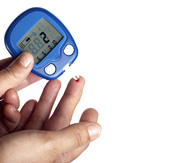< Return to trials
Type 2 Diabetes

Overview
Lillestol Research has performed an exceptional amount of trials involving the type II diabetes indication/diagnosis. The trials have varied in phase, enrollment criteria, and trial duration. Type II diabetes is one of our most experienced trial indications to recruit to with more than 50 clinical trials performed in this indication to date. Dr. Lillestol’s trial work in this indication is impressive, and it has led to many strides in the industry’s development of available treatments for type II diabetes. The multitude of trials that we have performed in this indication has developed a robust research patient database of over 2,000 individuals with a type II diabetes diagnosis that would be interested in clinical trial participation.
Spotlight Trial(s)
- This was a comparator trial of an investigational product and an after-market product both used in combination with Metformin in patients with type II diabetes. Lillestol Research was able to meet the sponsor’s enrollment expectation randomizing 8 patients to the trial in a 16-month enrollment period.
- This was a comparator trial of an investigational product and an after-market product both used in combination with Insulin Lispro for the treatment to target in patients with type II diabetes. Lillestol Research was able to meet and exceed the sponsor’s enrollment expectation randomizing 11 patients to the trial in a 9-month enrollment period.
- This was an open label, patient preference study for insulin glargine pen versus conventional vial/syringe insulin glargine in patients with type II diabetes. Lillestol Research was able to meet and far exceed the sponsor’s enrollment expectation randomizing 20 patients to the trial in an 8-month enrollment period.
- This was a comparator trial of an investigational product and an after-market product for patients with type II diabetes advanced to multiple injection bolus insulin with insulin lispro. Lillestol Research was able to meet and far exceed the sponsor’s enrollment expectation randomizing 25 patients to the trial in a short 6-month enrollment period.
- This was a generic medication, placebo-controlled trial to evaluate cardiovascular outcomes in patients with type II diabetes and pre-existing cardiovascular disease. This long-term outcomes trial lasted nearly 5 years and had excellent patient retention rates. Lillestol Research was able to meet and far exceed the sponsor’s enrollment expectation randomizing 44 patients to the trial.
Definition
Type 2 diabetes is a metabolic disorder that is characterized by high blood glucose (high blood sugar) in the context of insulin resistance.
Description
People with type 2 diabetes have what is called insulin resistance, i.e. their pancreas does not make enough insulin or the body cannot use the insulin well enough. When there isn't enough insulin or the insulin is not used as it should be, glucose (sugar) can't get into the body's cells. When glucose builds up in the blood instead of going into cells, the body's cells are not able to function properly.
Causes and Symptoms
The cause of type 2 diabetes is not necessarily known, but there are several risk factors for developing type 2 diabetes including:
- Heredity/genetic link
- High blood pressure
- High blood triglyceride (fat) levels
- Gestational diabetes or giving birth to a baby weighing more than 9 pounds
- High-fat and carbohydrate diet
- High alcohol intake
- Sedentary lifestyle
- Obesity or being overweight
- Ethnicity: Certain groups, such as African Americans, Native Americans, Hispanic Americans, and Japanese Americans, have a greater risk of developing type 2 diabetes than non-Hispanic whites
- Aging: Increasing age is a significant risk factor for type 2 diabetes. The risk of developing type 2 diabetes begins to rise significantly at about age 45 years, and rises considerably after age 65 years.
The classic symptoms of type 2 diabetes are excess thirst, frequent urination, and constant hunger.
A1c testing
A1c is a test that shows the average level of blood sugar over the past 2 to 3 months. People with diabetes need to have this test done regularly to see whether their blood sugar levels have been staying within a target range. This test is also used to diagnose diabetes. We are able to do A1c testing at Lillestol Research in order to determine if you fall within the diabetic range.
Source
http://diabetes.webmd.com/guide/type-2-diabetes
If you have been diagnosed with type 2 diabetes or think you may have type 2 diabetes, contact us today to learn more about our current study opportunities for this diagnosis.
Call us at (701) 232-7705 or toll-free at (866) 532-7705.
Signup online or email our recruiter at recruiter(at)lillestolresearch(dot)com.
Your information is always kept confidential.